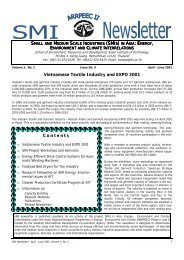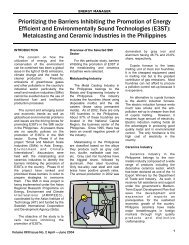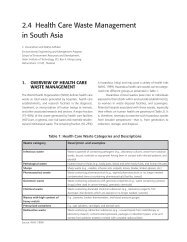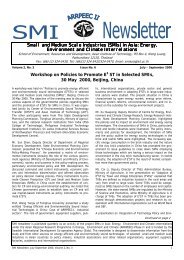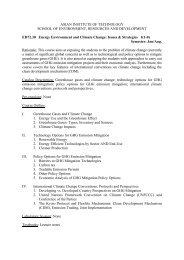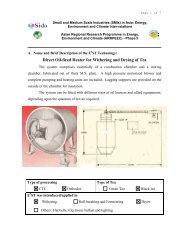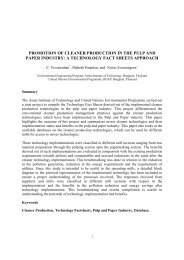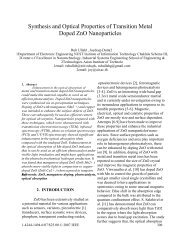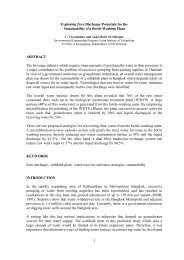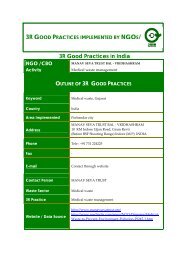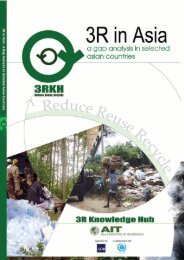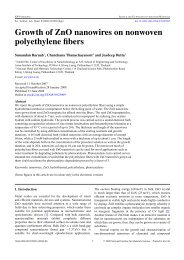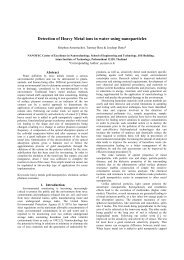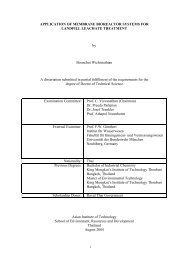Evaluation of Plastic Waste Management in Thailand Using Material ...
Evaluation of Plastic Waste Management in Thailand Using Material ...
Evaluation of Plastic Waste Management in Thailand Using Material ...
Create successful ePaper yourself
Turn your PDF publications into a flip-book with our unique Google optimized e-Paper software.
D.2 Calculation <strong>of</strong> the material flow <strong>of</strong> plastics <strong>in</strong> <strong>Thailand</strong>, 2010<br />
Table D-2 Details <strong>of</strong> calculation <strong>of</strong> the material flow <strong>of</strong> plastics <strong>in</strong> <strong>Thailand</strong>, 2010<br />
No. Description<br />
1<br />
2<br />
Imported pellet<br />
(Thermoplastic)<br />
Imported pellet<br />
(Thermosett<strong>in</strong>g)<br />
Value<br />
(Tonnes/year)<br />
716,000<br />
221,827<br />
188<br />
Assumption and Calculation<br />
The amount <strong>of</strong> imported pellet which is used to produce plastic products <strong>in</strong> the plastic manufactur<strong>in</strong>g.<br />
The amount <strong>of</strong> imported pellets was presented <strong>in</strong> the Custom Department website and PTIT<br />
presentation (Custom Department, 2013 and PTIT, 2010). The HS-code for imported and exported<br />
plastic pellets is <strong>in</strong> range <strong>of</strong> 3901-3914.<br />
The thermoplastic pellet was 716,000 tonnes <strong>of</strong> imported pellet <strong>in</strong> 2010 (PTIT presentation, 2010),<br />
while the thermoplastic pellet was 577,727 tonnes <strong>of</strong> imported pellet <strong>in</strong> 2010 (Custom Department,<br />
2013). The HS-code for thermoplastic pellets is <strong>in</strong> range <strong>of</strong> 3901-3908. However, the PTIT<br />
presentation only presented the amount <strong>of</strong> thermoplastic pellets, but it did not present the amount <strong>of</strong><br />
thermosett<strong>in</strong>g pellets.<br />
716,000 tonnes/year <strong>of</strong> thermoplastic materials was shown <strong>in</strong> the material flow because this amount<br />
is recorded by the petrochemical <strong>in</strong>dustry which has a responsibility on petrochemical products.<br />
While, Custom Department records the imported and exported statistic based on HS-codes which<br />
give unclear def<strong>in</strong>ition on each type <strong>of</strong> imported and exported product.<br />
Thermosett<strong>in</strong>g plastic <strong>in</strong>cludes epoxy, polyester, phenolic (e.g., phenol-formaldehyde, ureaformaldehyde,<br />
and melam<strong>in</strong>e-formaldehyde), alkyd, styrene-butadiene rubber (SBR), polyimide,<br />
polyurethane, and silicone. The amount <strong>of</strong> thermosett<strong>in</strong>g pellets was 221,827 tonnes <strong>of</strong> imported<br />
pellets <strong>in</strong> 2010 (Custom Department, 2013), and HS-code <strong>of</strong> thermosett<strong>in</strong>g pellet is 3907, 3909, and<br />
3910.




